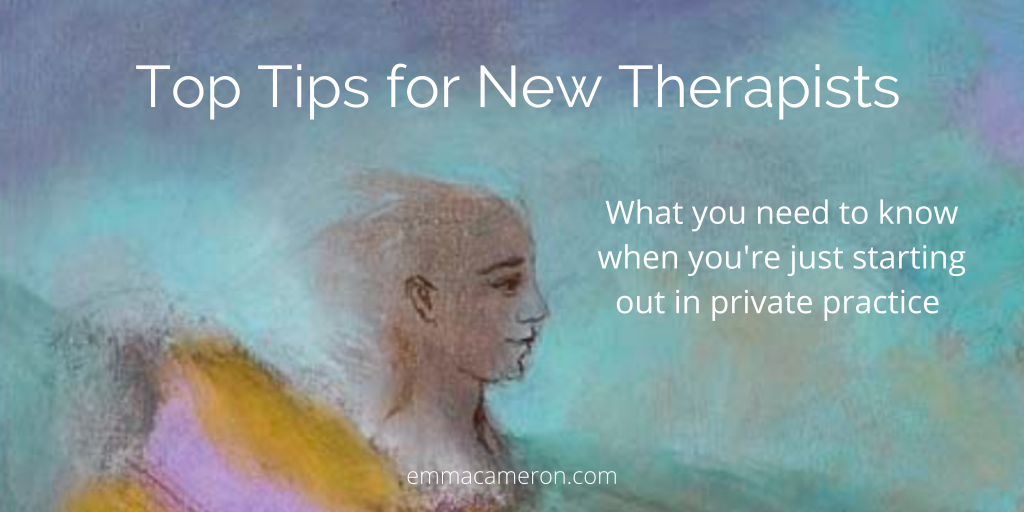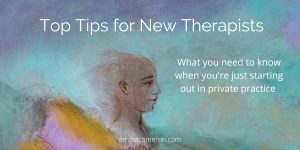
You’re starting out as a new therapist, beginning to think about building your own private practice. You’ve had loads of training, read masses of theory, and you’ve also had experience of working clinically with clients in placements. Now it’s time for the ‘business stuff’ – which they don’t usually teach you in therapy trainings! So how do you figure out what you’ll need to do to get started in private practice? You want to work effectively, safely, and ethically. And you’re hoping your new career will be both rewarding and keep you afloat financially. You need some top tips for new therapists starting in private practice 😉
When I started out in private practice, I could have done with a bit more guidance and support. There were lots of false starts and pitfalls, and I had to gather what tips I could in a rather haphazard way. Fast-forward to today, and I love giving that guidance and support to my supervisees and trainees as they get to grips with working in private practice as a therapist. I also love sharing more widely, to support all of us as therapists, as we try to change the world one session at a time.
So in this blog post I’ve collected together lots of tips for new therapists starting in private practice, gleaned from my colleagues and myself – I hope you find them helpful as you navigate your journey as a new therapist.
Top Tips for New Therapists Starting Out
“It’s hard at first when you are renting a shared room. I had times when I’d lug my art supplies there, and the client wouldn’t turn up! I had to manage my feelings around that.”
“I wish I’d made my website sooner when I first started in private practice.”
“It took me a long time to build my practice – about three years to reach my maximum of 15 clients.”
“For me it was really quick – I was pretty full in about four months. That’s because of the therapy centre I am part of – we can refer prospective clients to each other.”
“I found that when I needed new clients, I had to create specific time slots and put them clearly in my diary. If I was clear in my mind that I wanted clients who would fill those exact slots, it happened! I don’t know how this works, but it always seems to.”
Therapists Give their Tips: “I wish I’d known…”
“I wish I’d realised sooner how deeply my race, gender and class were influencing my sense of worth and expectations around being properly compensated financially, and how this was affecting my client work.”
“I wish I’d really understood how important boundaries are, e.g. payment for missed sessions.”
“I wish I’d known that I needed to build in structures for self-support to ensure regulation and balance. I learnt this the hard way and I nearly left the profession.”
“The main thing I think looking back was to really consider the impact it would have on my family – even though I had a purpose-built room separate to my house, I think it still affected them as they would be aware of when clients were coming etc. I wonder now if I would have been better renting a room somewhere whilst they were growing up. Of course they (including my spouse) all knew I was giving strangers my undivided attention for an hour (and therefore not them).”
“Starting in private practice, I wish I’d known that I didn’t have to take on everyone who wanted to work with me.”
“I wish I’d known that I needed to assess risk much more thoroughly. My first client who I saw privately was very suicidal with a very clear plan and a reluctance to give up his plan. He was very intelligent and high functioning so nobody around him was aware. So now I spend a bit more time on assessing risk when first making contact with someone. And pre-empt that initial conversation more, by talking about us seeing whether or not we are a good match – to really convey that it is not guaranteed that we will work together.”
“I got experience the hard way, through a couple of clients who I’ve taken on when I knew I should probably have said no, and it’s turned into a bit of a nightmare. It hasn’t led to productive work for them, and it has been a real cause of anguish for me. ”
Therapists Give their Tips: “I’m glad I knew…”
“I’m glad I knew to spend lots of time (several days!) in my therapy room before I even got my first client, to help me feel really calm and settled in the space. I also got a friend to come with me a couple of times, to help me rehearse using the doorbell system, walking through the building with the client, unlocking and locking the room, getting the art materials out, and helping me figure out how I’d set them up, etc.”
“Starting in private practice, I’m glad I knew to have a separate bank account which was just for my therapy business. That made it much easier to track payments and expenses. And I kept a spreadsheet too, which has helped a lot.”
“I’m glad I knew to have clients pay me via BACS a day before the session instead of paying at the end of the month.”
“My top tip for new therapists is to trust your gut. More than once I’ve had to say ‘no’ when I wasn’t exactly sure why I was saying no, but I had just felt a certain uneasiness.”
“I’m glad I knew that CPD enriches your practice and keeps you moving forwards… and it keeps your tax bill down too! I’m in love with CPD.”
“I’m glad I knew to have lots of supervision, and I also stayed in therapy, which I think is so supportive when starting in private practice, busting the counter-transference! I feel very well supported in my work and this feels vital to me. All part of the container!”
“I am glad I got help with creating a client contract. I keep reviewing and tweaking it, but at least I had something to start from.”
Top Tips for New Therapists about Money Matters
“My top tip for newly qualified therapists starting in private practice is to charge a decent fee from the get-go and get some therapeutic support if this is challenging. You will undercut and devalue the professional locally if this isn’t attended to. Doing the M.A., we paid vast amounts of money to train for 4 years and this really helped me to value what I do (though I still sometimes have those ‘am I worth £xxx’ conversations with myself, I also rationally know my worth due to training, practice, unique life experience, CPD (a lot of!!) etc). So, for me, no free initial meetings, the person pays whether we continue or not.”
“Because I value my own personal therapy highly (and I pay my therapist her full fee) it helps me to have faith that my services are worth paying for, and genuinely adding value to my clients’ lives. I can now really recognise that my own therapy has been the best investment I could have made (though I’ll admit that it took me a while to reach that point!) This means that I have no problems charging clients the full fee. Because I know from experience that good therapy is worth every penny!”
“My top tip for new therapists is get to grips with your personal ‘money story’ – I think this is crucial because it affects how you are around setting fees and holding boundaries around the fee. And once you are clearer and less fuzzy in your own attitude to money, it means you can really be available to help your clients with their money issues. Ultimately both you and your clients benefit.”
Shortcut to Creating Client Documentation
If you’re in a hurry and want an instant time-saver (or if you’re just feeling overwhelmed at the thought of writing your client documentation from scratch!), my Online Therapist’s Pack contains four documents which you can adapt for your own use. These will likely be useful even if you don’t plan to do any online therapy, as most of the content also applies to in-person client work. You can access it here.
More Resources for Therapists
Take a look at my main ‘for therapists’ page where you’ll find more to help you and your clients.
Have Your Say
What are your own top tips for new therapists? What would you have included in this list? I’d love it if you’d be willing to share your tips in the comments below!
